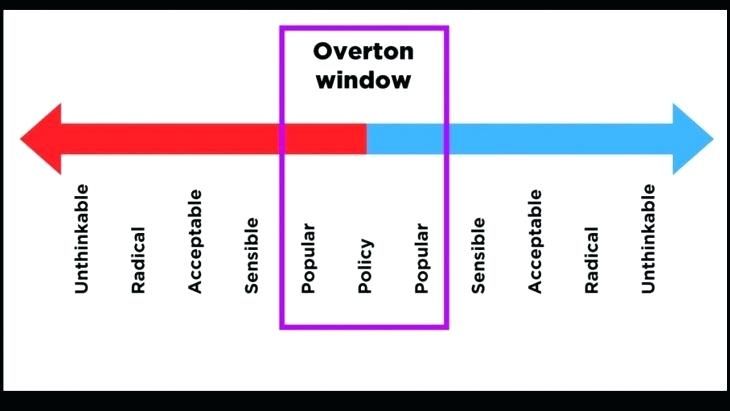Out the Overton Window
It seems that we have finally reached the limits of Vox’s “explanatory journalism.” Like most of you, I imagine, I had supposed there were no limits, and that nothing was beyond the powers to explain of the smartest kids in the class, the kids who grew up to run what James Taranto of the Wall Street Journal used to call that “young adult website.” But when it came to what Vox’s Emily Stewart called the “Bud-lash” against Anheuser-Busch, the whiz kids could do no better than this: “The Bud Light boycott, explained as much as is possible.”
“As much as is possible” for them, anyway. Ms Stewart included several assurances that the boycott was a minor hiccup and unlikely to last or to damage Anheuser-Busch’s share price in the long term. But saying that there’s nothing much to explain isn’t quite the same thing as an explanation. What Ms Stewart could reveal was that the boycott had something to do with the “transgender” influencer Dylan Mulvaney, who used Bud Light to celebrate his/her “365 days of womanhood” — and the fact that this “made some people very mad.”
Beyond that, the explanatory cupboard turned out to be bare. I trust that few of my readers will require an elucidation of this mystery. Decades of advertising by multiple brewers, all of which associated beer drinking, not entirely gratuitously, with working-class masculinity surely must have led many if not most consumers of Bud Light into believing that its makers were thinking of them as members, along with Dylan Mulvaney, of what is grandly called the “transgender community” — something that few of them were or wanted to be thought of as being.
The boycott could thus be described as one of those “irritable mental gestures which seek to resemble ideas” of which Lionel Trilling saw the American conservatism of the 1950s as consisting. You’d think that this would be a congenial explanation to the Voxers, and yet it somehow eluded them. There must be something about the ideology shared by Ms Stewart and all the other brainiacs at Vox that unfits them for understanding how anyone else who is not merely bigoted or wilfully ignorant could do other than admire the exquisite femininity of Ms Mulvaney and seek a closer association with her by drinking her preferred brand of beer. If they had had the imaginative capacity to see the world through others’ eyes, the hard question of the Bud Light boycott would not have seemed hard to them at all.
There’s a lot of it about. Here’s the sub-head to an article by Robert Kuttner of The American Prospect on President Joe Biden: “He’s been a terrific president. Why are his ratings so consistently low?” Do you want to tell him, or shall I? It’s one thing to think that “he’s been a terrific president.” A lot of left wing Democrats must think so, since Mr Biden has done all that the left has asked of him and will doubtless continue to do so. No mystery about that. But how to account for the mystery of Mr Kuttner’s mystification that everybody (or at least a spanking majority of people) doesn’t think like a left-wing Democrat? A few years ago it would hardly have seemed possible that anyone could be so lacking in imaginative sympathy with viewpoints different from his own, but nowadays we see it all the time.
In making this point, I would like to think that I am, in Coleridgian terms, understanding of his ignorance rather than ignorant of his understanding, but no doubt Mr Kuttner would think the same of me. He would perhaps find it as easy to answer the hard questions I have been asking myself over the last month or so as I find it to answer his. Could it be that I am similarly blinkered by my very limited point of view and lack of imagination? It may be so. Let’s look at a few of those questions that I find it as hard to answer as he does the one about Joe Biden’s low approval rating.
The first of these is the converse (or is it the obverse?) of his. Why do we find that Mr Biden, a man who is visibly in mental decline himself and who is presiding over an unprecedented era of American decline still polling (at least as of the end of April) at over 40 per cent approval and planning to run, as an octogenarian, for another four-year term with every prospect of success?
Let’s come back to that one. Here are a few others.
Item: Why would Chicago voters repudiate a disastrous mayor like Lori Lightfoot only to replace her with someone like Brandon Johnson who, on all rational expectation, will almost certainly be worse?
Item: Why would Fox News fire its highest-rated on-air performer with an effect on its stock price comparable to or worse than that of the Dylan Mulvaney backlash on Anheuser-Busch’s?
Item: Casting our glance across the Atlantic for a moment, I wonder with Charles Moore of the London Daily Telegraph, “Why is the Left in the driving seat of government after 13 years of Tory rule?”
Item: Why do so many doctors, all of whom have sworn an oath affirming that they will, “first, do no harm” and who presumably have the well-being of their patients as their top priority also affirm a “gender” ideology which anyone not involved in that ideology can see is likely to ruin the lives of many if not most of their youngest and most vulnerable patients?
Item: Why does it remain a small and isolable minority of feminists — a minority stigmatized by their former comrades as the hated TERFs or “Trans-Exclusionary Radical Feminists” — who protest against the admission of biological males claiming female “identity” into athletic competition against biological women and their invasion of hitherto all-female secure spaces?
And, finally, the hardest question of all and one which seems to me to comprise all the others at some level: why does an even tinier minority of people seem to recognize that their lives are being turned upside down by a cultural revolution which the left hardly even bothers to conceal anymore — so that it is these few right-wing Cassandras and not the revolutionaries themselves who are plausibly represented by the business-as-usual media as “extremists”?
I think I can see one or two of the points in this series of hard questions at which a leftie friend — let’s call him Brandon — might point and say, “There’s your problem.” A propos of that other Brandon, Brandon Johnson, for instance, I say that “on all rational expectation” things in Chicago will get worse. Likewise, in the question about the presumptively well-meaning doctors, I say that the life of anyone undergoing a pre-pubertal sex change “is likely” to be ruined. “How can you know these things?” says Brandon. “That’s just your opinion, man!” And if I were stumblingly to reply that it’s only common sense, Brandon’s triumph would be complete. “How do you suppose we could have made any progress at all in our understanding of the relationship between police and crime, or sex and gender, if we had relied on ‘common sense’ instead of science to inform our opinions about these things?”
I don’t think I can be the only one who, post-pandemic, is markedly less impressed by the invocation of the magic word “science” than I used to be, but I’ve got to admit that Brandon has a point. As radio personality Chris Plante so often puts it, “common sense isn’t.” Not any more. Though which of the two words, “common” or “sense,” goes with “isn’t” will depend on your politics. Common sense, like rational expectation and, indeed, what we were wont to call reality itself is now just another bubble — a bubble in which we reality-lovers are as trapped and therefore as tribal as the Brandons of this world are in theirs.
Nowadays, as I have had occasion to mention before, reality is plural, proprietorial and indissolubly linked to identity politics. Which is why so many political women are prepared to welcome “transgender” sisters into their all-female spaces, even those so hard-won as women’s sports. As it has been an article of faith among the most doctrinaire feminists that gender is socially constructed in the first place, there can be no grounds for excluding the re-constructed. The reality of sex over gender, like the reality of police deterring crime, can only belong to a few of us old-timers who continue to resist change and has nothing to do with the discrete and carefully manufactured realities of radical feminists, Chicago Democrats or “woke” doctors.
For the same reason, neither Brandon nor I can look forward to the day when the other will be proved wrong by reality. That’s what it means to live inside a bubble: you never have to recognize any reality outside it. Short of an ideological earthquake, therefore, Chicagoans can probably look forward to a dynasty of Brandons that will outlast even that of the Dalys. At least those who are subject to the discipline of the market, like Anheuser-Busch or Fox News must keep in touch, to some extent, with the sort of reality over which they do not have control if they want to stay in business — which is what makes the recent collisions with such realities on both their parts so puzzling on any other assumption than wilful blindness.
In the case of the cancellation by Fox News of Tucker Carlson’s show, however, I think there is something more than that going on. Rupert Murdoch’s company and Mr Murdoch himself have not made their millions and their billions by being oblivious to the market for their services. They have always done so by teetering on the edge of respectability, like (though on a much larger scale) the vendors of naughty post cards or the double-entendre comedians of yesteryear. But respectability is defined differently over time, as that comparison suggests. So Tucker Carlson got cancelled for the same reason that the topless page 3 girls did in The Sun, long the Murdoch flagship tabloid in Britain: because they had ceased to be even marginally respectable.
And how did that happen? I think it was the combination of the Tucker Carlson program’s seeming to creep up on the allegation of a deep-state conspiracy behind the events of January 6, 2021 combined with the fact that Donald Trump is suddenly looking both unbeatable in the GOP primaries and certain to lose in the general election — something which also must have inspired President Biden to announce that he is running again. To Mr Murdoch, the assurance of Mr Trump’s ultimate failure, even if he survives his current legal troubles, means that the Democrats’ and the media’s narrative about January 6 (and other Trump-related things) has finally won out and that Tucker is, therefore, not even marginally respectable anymore. Subsequent leaks about his use of vulgar language in private conversations must have been meant to reinforce this impression with the public.
You could say that his defenestration was through the Overton window, which purports to describe which political views are respectable at a given moment and which are not (see “United only in hate” in The New Criterion of December, 2020). And I think another closing of an Overton window — the one through which Thatcherite Tories crept into power — explains the demise of what Charles Moore, Lady Thatcher’s biographer, thinks of as distinctively Tory government in Britain.
Politicians, like media moguls, must gauge the public taste, and with it any changing consensus about which political views it is respectable to hold and which can only be held by “extremists” or kooks. Thus, it was because the previous Tory prime minister, Liz Truss, misjudged the Overton window for tax cuts that she had to go after only 45 days in office — not because her tax cuts and the attempt to “go for growth” that motivated them were not a good idea in strictly economic terms.
But here the question arises as to who determines where the Overton window opens and where it does not. If we can answer that one, I think we will also have found the answer to both the first and the last of my hard questions above. For we know that when socially and historically established beliefs about the world break down, people will tend to believe what they want to believe. And increasing numbers of them want to believe in something like the “woke” ideology which promises liberation from old-fashioned notions of reality, by “fundamentally transforming” (to use Barack Obama’s expression) the country and its institutions.
This, in turn, creates what the philosopher Dan Williams calls a “marketplace of rationalizations” for the new ideology — a marketplace which the media have now geared themselves up to cater for at the expense of more traditional kinds of reporting or rational inquiry. And one of the best-sellers among such rationalizations, particularly among those who are living fairly comfortable lives, is that despite what may seem like revolutionary developments, things are going on pretty much as they always have done, but for the increasingly paranoid fantasies of the extreme right.
The great image of this head-in-the-sand attitude is that of Omar Jimenez of CNN reporting against the visible background of burning buildings during the Kenosha riot of August, 2020, that the protests there were “Fiery but mostly peaceful.” That swiftly became a joke, of course, but a joke whose tendency was also to reassure people that nothing very important was at stake. It was just good old-fashioned media “bias” — long familiar to us as a simple if occasionally annoying fact of life. If you were not in Kenosha at the time, or a target of the mob, you could tell yourself that the “protesters” were just slightly more enthusiastic versions of the old civil rights marchers of whom Joe Biden sometimes claims to have been one — people who just want to “change the world” for the better.
If and when even more radical and more violent world-changers take to the streets, the expectation that the media will make light of them and reassure us that there’s nothing to see here will itself act as a form of reassurance that nothing very much has really changed, and that it is the right-wing resisters of change, now identified with Trump supporters, who are the real extremists.
Another way of putting this is to say that all journalism is now “explanatory journalism.” People no longer want or trust “just the news” but, like Vox’s young adult readership, need to have it explained to them, and explained in such a way that it will fit into their view of the world through the Overton Window. Thus when, in May, Congressman James Comer produced the most damning evidence imaginable of the President’s corruption when he was vice president under Barack Obama, The New York Times reported that, because the foreign gratuities were paid to his family members rather than to him personally, there is “No Evidence of Wrongdoing by President Biden.” Nothing to see here, folks. As you will be happy to hear.
This is no doubt how President Biden’s hopes of re-election can remain as buoyant as ever — and also how so many people have apparently come to believe, in the midst of a revolution, that everything is more or less the same as it has always been. I’m very much afraid, finally, that it is the reason why the Overton Window is about to close on American life as we have known it up to now. Of course, like the Voxers or poor Mr Kuttner, I may be missing something. I do hope so.
Discover more from James Bowman
Subscribe to get the latest posts to your email.






